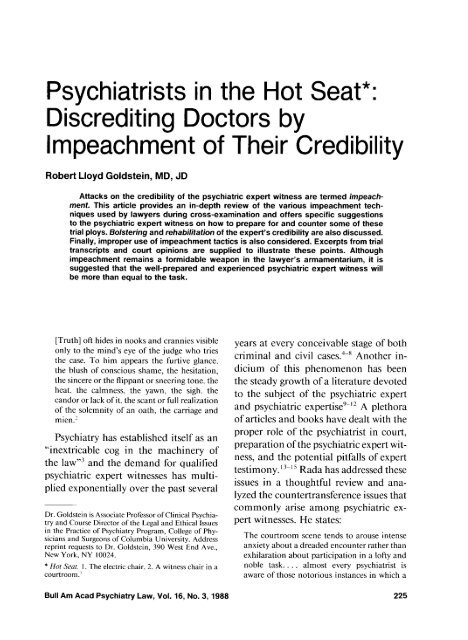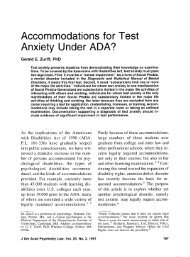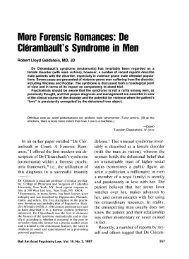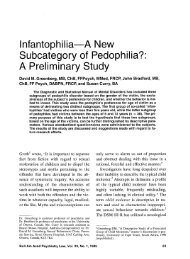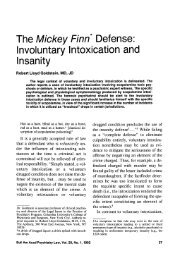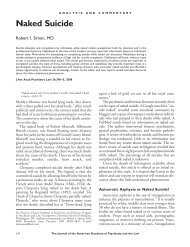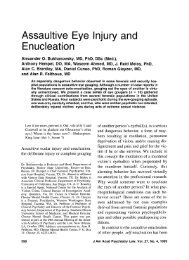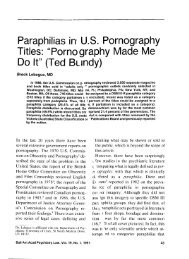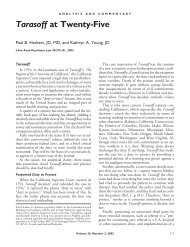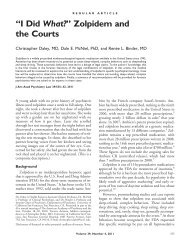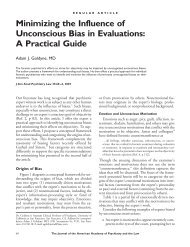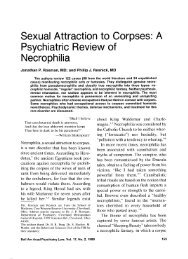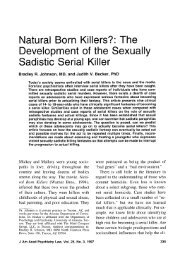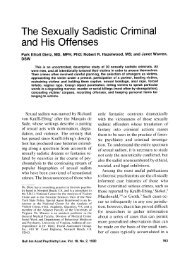Psychiatrists in the Hot Seat*: Discrediting Doctors by Impeachment ...
Psychiatrists in the Hot Seat*: Discrediting Doctors by Impeachment ...
Psychiatrists in the Hot Seat*: Discrediting Doctors by Impeachment ...
You also want an ePaper? Increase the reach of your titles
YUMPU automatically turns print PDFs into web optimized ePapers that Google loves.
<strong>Psychiatrists</strong> <strong>in</strong> <strong>the</strong> <strong>Hot</strong> <strong>Seat*</strong>:<br />
Discredit<strong>in</strong>g <strong>Doctors</strong> <strong>by</strong><br />
<strong>Impeachment</strong> of Their Credibility<br />
Robert Lloyd Goldste<strong>in</strong>, MD, JD<br />
Attacks on <strong>the</strong> credibility of <strong>the</strong> psychiatric expert witness are termed impeach-<br />
ment. This article provides an <strong>in</strong>-depth review of <strong>the</strong> various impeachment tech-<br />
niques used <strong>by</strong> lawyers dur<strong>in</strong>g cross-exam<strong>in</strong>ation and offers specific suggestions<br />
to <strong>the</strong> psychiatric expert witness on how to prepare for and counter some of <strong>the</strong>se<br />
trial ploys. Bolster<strong>in</strong>g and rehabilitation of <strong>the</strong> expert's credibility are also discussed.<br />
F<strong>in</strong>ally, improper use of impeachment tactics is also considered. Excerpts from trial<br />
transcripts and court op<strong>in</strong>ions are supplied to illustrate <strong>the</strong>se po<strong>in</strong>ts. Although<br />
impeachment rema<strong>in</strong>s a formidable weapon <strong>in</strong> <strong>the</strong> lawyer's armamentarium, it is<br />
suggested that <strong>the</strong> well-prepared and experienced psychiatric expert witness will<br />
be more than equal to <strong>the</strong> task.<br />
[Truth] oft hides <strong>in</strong> nooks and crannies visible<br />
only to <strong>the</strong> m<strong>in</strong>d's eye of <strong>the</strong> judge who tries<br />
<strong>the</strong> case. To him appears <strong>the</strong> furtive glance.<br />
<strong>the</strong> blush of conscious shame, <strong>the</strong> hesitation,<br />
<strong>the</strong> s<strong>in</strong>cere or <strong>the</strong> flippant or sneer<strong>in</strong>g tone, <strong>the</strong><br />
heat, <strong>the</strong> calmness, <strong>the</strong> yawn, <strong>the</strong> sigh, <strong>the</strong><br />
candor or lack of it. <strong>the</strong> scant or full realization<br />
of <strong>the</strong> solemnity of an oath, <strong>the</strong> carriage and<br />
mien.'<br />
Psychiatry has established itself as an<br />
"<strong>in</strong>extricable cog <strong>in</strong> <strong>the</strong> mach<strong>in</strong>ery of<br />
<strong>the</strong> lawm3 and <strong>the</strong> demand for qualified<br />
psychiatric expert witnesses has multiplied<br />
exponentially over <strong>the</strong> past several<br />
Dr. Coldste<strong>in</strong> is Associate Professor of Cl<strong>in</strong>ical Psychia-<br />
try and Course Director of <strong>the</strong> Legal and Ethical Issues<br />
<strong>in</strong> <strong>the</strong> Practice of Psychiatry Program, College of Phy-<br />
sicians and Surgeons of Columbia University. Address<br />
repr<strong>in</strong>t requests to Dr. Goldste<strong>in</strong>, 390 West End Ave.,<br />
New York, NY 10024.<br />
* <strong>Hot</strong> Srut. 1. The electric chair. 2. A witness chair <strong>in</strong> a<br />
courtroom.'<br />
years at every conceivable stage of both<br />
crim<strong>in</strong>al and civil ~ases.~-%no<strong>the</strong>r <strong>in</strong>dicium<br />
of this phenomenon has been<br />
<strong>the</strong> steady growth of a literature devoted<br />
to <strong>the</strong> subject of <strong>the</strong> psychiatric expert<br />
and psychiatric e~pertise~-'~ A plethora<br />
of articles and books have dealt with <strong>the</strong><br />
proper role of <strong>the</strong> psychiatrist <strong>in</strong> court,<br />
preparation of <strong>the</strong> psychiatric expert witness,<br />
and <strong>the</strong> potential pitfalls of expert<br />
testim~ny."'~ Rada has addressed <strong>the</strong>se<br />
issues <strong>in</strong> a thoughtful review and analyzed<br />
<strong>the</strong> countertransference issues that<br />
commonly arise among psychiatric expert<br />
witnesses. He states:<br />
The courtroom scene tends to arouse <strong>in</strong>tense<br />
anxiety about a dreaded encounter ra<strong>the</strong>r than<br />
exhilaration about participation <strong>in</strong> a lofty and<br />
noble task. . . . almost every psychiatrist is<br />
aware of those notorious <strong>in</strong>stances <strong>in</strong> which a<br />
Bull Am Acad Psychiatry Law, Vol. 16, No. 3, 1988 225
dist<strong>in</strong>guished and em<strong>in</strong>ent psychiatrist has<br />
ventured <strong>in</strong>to <strong>the</strong> courtroom only to leave<br />
feel<strong>in</strong>g humiliated and degraded. One does not<br />
have to be arrogant, unwill<strong>in</strong>g to have one's<br />
views questioned. as is often suggested <strong>by</strong> our<br />
legal colleagues, to feel threatened about court-<br />
room testimony. ''<br />
This "dreaded encounter" is epito-<br />
mized <strong>in</strong> <strong>the</strong> process of impeachment <strong>by</strong><br />
oppos<strong>in</strong>g counsel dur<strong>in</strong>g cross-exami-<br />
nation of <strong>the</strong> psychiatric expert witness.<br />
Although <strong>the</strong> oppos<strong>in</strong>g side is entitled to<br />
a vigorous cross-exam<strong>in</strong>ation, at times<br />
<strong>the</strong> proper bounds of courtroom deco-<br />
rum are violated and <strong>the</strong> expert is sub-<br />
jected to personal attack and harass-<br />
ment. This prospect has contributed to<br />
<strong>the</strong> reluctance of many reputable experts<br />
to <strong>in</strong>volve <strong>the</strong>mselves <strong>in</strong> litigation." A<br />
number of books and treatises purport<br />
to provide <strong>the</strong> lawyer with a systematic<br />
and methodical basis to impugn <strong>the</strong><br />
credibility of psychiatric expert wit-<br />
nesses.'*-" This article will focus on <strong>the</strong><br />
process of impeachment itself, provid<strong>in</strong>g<br />
an <strong>in</strong>-depth review of <strong>the</strong> various im-<br />
peachment techniques used <strong>by</strong> lawyers<br />
and offer<strong>in</strong>g specific suggestions on how<br />
to prepare for and effectively counter<br />
some of <strong>the</strong>se trial ploys. Whenever pos-<br />
sible excerpts will be supplied from trial<br />
transcripts and court op<strong>in</strong>ions to illus-<br />
trate <strong>the</strong>se po<strong>in</strong>ts.<br />
The Credibility of Witnesses and<br />
<strong>Impeachment</strong> Techniques<br />
Credibility (or believability) is a vitally<br />
important factor <strong>in</strong> <strong>the</strong> testimony of psy-<br />
chiatric expert witnesses. Often <strong>the</strong> wit-<br />
ness's credibility becomes <strong>the</strong> central is-<br />
sue <strong>in</strong> a "battle of <strong>the</strong> experts," <strong>the</strong> out-<br />
come turn<strong>in</strong>g on whom <strong>the</strong> jury chooses<br />
to believe. The lawyer who has reta<strong>in</strong>ed<br />
226<br />
Goldste<strong>in</strong><br />
a psychiatric expert witness naturally<br />
wishes to build up that witness's credi-<br />
bility <strong>in</strong> <strong>the</strong> jury's eyes. In do<strong>in</strong>g so (on<br />
direct exam<strong>in</strong>ation), <strong>the</strong> lawyer is said<br />
to be "bolster<strong>in</strong>g" <strong>the</strong> witness's credibil-<br />
ity. For example, a full recital of <strong>the</strong><br />
doctor's credentials, <strong>in</strong>clud<strong>in</strong>g profes-<br />
sional tra<strong>in</strong><strong>in</strong>g and experience, affilia-<br />
tions and appo<strong>in</strong>tments, authorship of<br />
professional papers, and presentations at<br />
conferences, is calculated to impress <strong>the</strong><br />
jury and <strong>in</strong>fluence <strong>the</strong>m to attach greater<br />
weight to <strong>the</strong> expert testimony.? Con-<br />
versely, <strong>the</strong> oppos<strong>in</strong>g counsel strives to<br />
assail <strong>the</strong> witness's credibility. Such at-<br />
tacks on <strong>the</strong> expert's credibility are<br />
termed impeachment."<br />
It is important to understand <strong>the</strong> dis-<br />
t<strong>in</strong>ction between two basic categories of<br />
evidence: substantive evidence and cred-<br />
ibility evidence. If <strong>the</strong> specialized scien-<br />
tific knowledge of <strong>the</strong> psychiatric expert<br />
will assist <strong>the</strong> jury to understand <strong>the</strong><br />
evidence or to determ<strong>in</strong>e a fact <strong>in</strong> issue,<br />
<strong>the</strong> expert is permitted to testify with an<br />
op<strong>in</strong>ion or <strong>in</strong>ference (sometimes even if<br />
that op<strong>in</strong>ion or <strong>in</strong>ference embraces an<br />
ultimate issue to be decided <strong>by</strong> <strong>the</strong><br />
jury)."-" The expert can also testify <strong>in</strong><br />
nonop<strong>in</strong>ion form, e.g., give a disserta-<br />
tion or exposition of scientific pr<strong>in</strong>ciples<br />
relevant to <strong>the</strong> case, leav<strong>in</strong>g <strong>the</strong> jury to<br />
apply <strong>the</strong>m to <strong>the</strong> facts. The expert's<br />
op<strong>in</strong>ion and/or exposition (and <strong>the</strong> facts<br />
or data on which <strong>the</strong>y are based) are<br />
substantive evidence, bear directly on<br />
tlt is necessary, as a threshold issue, to establish <strong>the</strong><br />
credentials of doctors <strong>in</strong> order to have <strong>the</strong> judge qualify<br />
<strong>the</strong>m as experts. The lawyer reta<strong>in</strong><strong>in</strong>g an expert will<br />
seek to capitalize on this requirement <strong>by</strong> emphasiz<strong>in</strong>g<br />
and even embellish<strong>in</strong>g <strong>the</strong>se credentials to bolster <strong>the</strong><br />
witness's credibility <strong>in</strong> <strong>the</strong> m<strong>in</strong>d of <strong>the</strong> jury.<br />
Bull Am Acad Psychiatry Law, Vol. 16, No. 3, 1988
Discredit<strong>in</strong>g <strong>Psychiatrists</strong><br />
<strong>the</strong> merits of <strong>the</strong> case, and certa<strong>in</strong>ly will<br />
be extensively probed and scrut<strong>in</strong>ized<br />
dur<strong>in</strong>g cross-exam<strong>in</strong>ation. In contrast to<br />
substantive evidence, credibility evidence<br />
has only <strong>in</strong>direct relevance to <strong>the</strong><br />
merits of <strong>the</strong> case (i.e., <strong>by</strong> reflect<strong>in</strong>g on<br />
<strong>the</strong> witness's credibility, it <strong>in</strong>fluences <strong>the</strong><br />
weight <strong>the</strong> jury will attach to <strong>the</strong> testimony<br />
which he gives concern<strong>in</strong>g <strong>the</strong><br />
merits).<br />
The various impeachment techniques<br />
commonly used <strong>by</strong> lawyers to attempt<br />
to discredit psychiatric expert witnesses<br />
will be presented <strong>in</strong> <strong>the</strong> follow<strong>in</strong>g sections.<br />
Demeanor$ <strong>Impeachment</strong> Quite<br />
aside from <strong>the</strong> substantive content of<br />
psychiatrists' testimony, <strong>the</strong>ir general<br />
appearance and conduct <strong>in</strong> <strong>the</strong> courtroom<br />
may sway a jury. In a previous<br />
article I discussed a recent New York<br />
case <strong>in</strong> which <strong>the</strong> judge <strong>in</strong> a bench trial<br />
rejected consensus op<strong>in</strong>ions <strong>by</strong> both defense<br />
and prosecution psychiatric expert<br />
witnesses to <strong>the</strong> effect that <strong>the</strong> defendant<br />
lacked crim<strong>in</strong>al re~ponsibility.~~ In question<strong>in</strong>g<br />
<strong>the</strong> credibility of both psychiatrists,<br />
<strong>the</strong> judge noted: "it was almost<br />
like pull<strong>in</strong>g teeth to get <strong>the</strong>m to answer<br />
a question. They ducked, dodged and<br />
equivocated throughout except when it<br />
came to express<strong>in</strong>g <strong>the</strong>ir [conclusory]<br />
op<strong>in</strong>ions as to <strong>the</strong> defendant's mental<br />
~tate."'~<br />
*"The demeanor of an orally testify<strong>in</strong>g witness is 'always<br />
assumed to be <strong>in</strong> evidence.' It is 'wordless language'<br />
. . . . [Testimony] may seem uncontradicted <strong>by</strong> one who<br />
merely reads it, yet it may be 'contradicted' <strong>in</strong> <strong>the</strong> trial<br />
court <strong>by</strong> his manner, his <strong>in</strong>tonations, his grimaces, his<br />
gestures, and <strong>the</strong> like-all matters which 'cold pr<strong>in</strong>t<br />
does not preserve' . . . . The witness' demeanor, not<br />
apparent <strong>in</strong> <strong>the</strong> record, may alone have 'impeached'<br />
him,""<br />
Oppos<strong>in</strong>g counsel is generally sensi-<br />
tive to <strong>the</strong> use that may be made of a<br />
witness's unfavorable demeanor to im-<br />
peach that witness dur<strong>in</strong>g cross-exami-<br />
nation <strong>in</strong> order to persuade <strong>the</strong> jury to<br />
reject that witness's damag<strong>in</strong>g testimony<br />
given dur<strong>in</strong>g direct exam<strong>in</strong>ation. The<br />
experienced cross-exam<strong>in</strong>er has an ar-<br />
mamentarium of tactics, <strong>in</strong>clud<strong>in</strong>g ad<br />
horn<strong>in</strong>ern attacks, argumentative ques-<br />
tion<strong>in</strong>g, ploys calculated to "shock" <strong>the</strong><br />
witness, and o<strong>the</strong>r anxiety-<strong>in</strong>duc<strong>in</strong>g<br />
techniques that are <strong>in</strong>tended to prompt<br />
negative demeanor, confusion and un-<br />
certa<strong>in</strong>ty <strong>in</strong> <strong>the</strong> witness. If such tactics<br />
are successful, <strong>the</strong> effects on <strong>the</strong> expert<br />
witness are usually not lost on <strong>the</strong> jury.<br />
Signs of distress, such as squirm<strong>in</strong>g and<br />
shift<strong>in</strong>g around <strong>in</strong> <strong>the</strong> witness chair, per-<br />
spir<strong>in</strong>g, cross<strong>in</strong>g and uncross<strong>in</strong>g of legs,<br />
look<strong>in</strong>g at <strong>the</strong> floor or ceil<strong>in</strong>g, and glanc-<br />
<strong>in</strong>g toward counsel for assistance, may<br />
raise questions <strong>in</strong> <strong>the</strong> jury's m<strong>in</strong>d. Psy-<br />
chological research <strong>in</strong>dicates that jurors<br />
have good "polygraph" <strong>in</strong>st<strong>in</strong>cts and at-<br />
tach a good deal of weight to <strong>the</strong> wit-<br />
ness's demeanor <strong>in</strong> assess<strong>in</strong>g credibil-<br />
ity .25-2"<br />
Ma<strong>in</strong>ta<strong>in</strong><strong>in</strong>g an effective demeanor<br />
dur<strong>in</strong>g courtroom testimony is a skill<br />
that requires practice and diligent prep-<br />
aration. Rada recommends thorough<br />
preparation <strong>in</strong> three areas: attitud<strong>in</strong>al<br />
preparation, cognitive preparation, and<br />
skill preparation.16 Although some anx-<br />
iety is to be expected <strong>in</strong> any courtroom<br />
encounter, it can be m<strong>in</strong>imized <strong>by</strong> care-<br />
ful attention to a number of considera-<br />
tions: (1) mastery of <strong>the</strong> specific com-<br />
plexities of <strong>the</strong> case, <strong>the</strong> psychiatric f<strong>in</strong>d-<br />
<strong>in</strong>gs, <strong>the</strong> legal issues to be addressed, and<br />
Bull Am Acad Psychiatry Law, Vol. 16, No. 3, 1988 227
<strong>the</strong> relevant professional literature; (2)<br />
achiev<strong>in</strong>g a good work<strong>in</strong>g alliance with<br />
<strong>the</strong> lawyer <strong>by</strong> means of pretrial strategy<br />
sessions, review of testimony to be given,<br />
anticipated cross-exam<strong>in</strong>ation, and<br />
strengths and weaknesses of <strong>the</strong> case; (3)<br />
practic<strong>in</strong>g <strong>the</strong> art of communication of<br />
relevant psychiatric knowledge to a jury<br />
of laymen (e.g., ma<strong>in</strong>ta<strong>in</strong><strong>in</strong>g good eye<br />
contact with <strong>the</strong> jury, avoid<strong>in</strong>g a con-<br />
descend<strong>in</strong>g manner, and avoid<strong>in</strong>g un<strong>in</strong>-<br />
telligible professional jargon).<br />
A number of commentators offer spe-<br />
cific advice on such matters as how to<br />
project confidence, how to dress, proper<br />
posture, ma<strong>in</strong>ta<strong>in</strong><strong>in</strong>g good eye contact,<br />
body language, and o<strong>the</strong>r nonverbal<br />
presentational characteristic^.^'-^^ Each<br />
expert is likely to develop a unique style<br />
of present<strong>in</strong>g testimony <strong>in</strong> a firm and<br />
confident manner, with sufficient prep-<br />
aration and experience. Perhaps <strong>the</strong> s<strong>in</strong>-<br />
gle most important admonition for <strong>the</strong><br />
expert witness is "be prepared to act<br />
courteously even if subjected to im-<br />
proper treatment <strong>by</strong> oppos<strong>in</strong>g coun-<br />
sel."16 (p. 156). Ma<strong>in</strong>ta<strong>in</strong><strong>in</strong>g a dignified,<br />
unrumed and courteous demeanor en-<br />
hances <strong>the</strong> professional image of expert<br />
witnesses and re<strong>in</strong>forces <strong>the</strong> jury's con-<br />
fidence <strong>in</strong> <strong>the</strong>ir testimony.<br />
<strong>Impeachment</strong> Based on Proof That <strong>the</strong><br />
Witness Is Biased The demonstration<br />
of bias <strong>in</strong> <strong>the</strong> psychiatric expert witness<br />
is logically relevant to impeachment of<br />
that witness. Bias may affect a witness<br />
consciously or unconsciously.20 With<br />
<strong>the</strong> proper amount of pretrial research<br />
and <strong>in</strong>vestigation, oppos<strong>in</strong>g counsel can<br />
sometimes unearth damag<strong>in</strong>g <strong>in</strong>forma-<br />
tion which demonstrates <strong>the</strong> possibility<br />
228<br />
Goldste<strong>in</strong><br />
or probability of bias on <strong>the</strong> part of <strong>the</strong><br />
expert. For example, it might be brought<br />
to <strong>the</strong> attention of <strong>the</strong> jury that <strong>the</strong> psy-<br />
chiatric expert has frequently been re-<br />
ta<strong>in</strong>ed <strong>in</strong> similar cases <strong>by</strong> <strong>the</strong> same law-<br />
yer who is call<strong>in</strong>g him or her as an expert<br />
witness <strong>in</strong> <strong>the</strong> present case; or it might<br />
be shown that <strong>the</strong> psychiatric expert al-<br />
ways testifies for one side and never for<br />
<strong>the</strong> o<strong>the</strong>r (e.g., <strong>in</strong> medical malpractice<br />
cases, <strong>the</strong> expert always testifies for <strong>the</strong><br />
defense or has some special relationship<br />
with <strong>the</strong> defense).<br />
Exumple I<br />
You have done previous work for <strong>the</strong><br />
Health and Hospital Corporation?<br />
I th<strong>in</strong>k I did have one or two cases with<br />
<strong>the</strong>m. but not <strong>in</strong> this office. <strong>in</strong> <strong>the</strong> Bronx 1<br />
believe.<br />
And that was where <strong>the</strong> Health and Hos-<br />
pital Corporation was a defendant; is that<br />
right?<br />
I believe so, yes.<br />
Okay, you have an ongo<strong>in</strong>g connection<br />
with <strong>the</strong> Health and Hospital Corporation:<br />
isn't that correct?<br />
I would say two cases <strong>in</strong> two years, is about<br />
it.<br />
No, my question is you have an ongo<strong>in</strong>g<br />
connection with <strong>the</strong> Health and Hospital<br />
Corporation. I'm not talk<strong>in</strong>g about testi-<br />
fy<strong>in</strong>g. I'm talk<strong>in</strong>g about your work at Belle-<br />
vue.?<br />
Well, I was at Bellevue from '74 to '75,<br />
yes.<br />
And don't you still do work at Bellevue?<br />
I teach. I am not paid <strong>by</strong> Bellevue.<br />
But you do teach at <strong>the</strong> Bellevue facility?<br />
I teach <strong>the</strong>. . . medical students <strong>the</strong>re, yes."'<br />
Exurnple 2<br />
Q. How much did you make as a result of<br />
your various consultations and testimonial<br />
performances from <strong>the</strong> Legal Aid Society<br />
last year, doctor?<br />
Defense Counsel: 1 object to <strong>the</strong> word 'performances.'<br />
Bull Am Acad Psychiatry Law, Vol. 16, No. 3, 1988
Discredit<strong>in</strong>g <strong>Psychiatrists</strong><br />
The Court: All right, as to form.<br />
Defense Counsel: If it is testimony, it is testi-<br />
mony. We don't need [<strong>the</strong><br />
prosecutor]-<br />
We will call it testimony.<br />
I work for [<strong>the</strong> Legal Aid Society], yes.<br />
And never <strong>the</strong> Bronx District Attorney's<br />
office. correct?<br />
Well. that is your fault. You know, you<br />
could hire me any time you want. I am <strong>in</strong><br />
<strong>the</strong> phone book.<br />
There may be a good reason we haven't."<br />
Ano<strong>the</strong>r fertile area for impeachment<br />
on <strong>the</strong> issue of bias regards <strong>the</strong> amount<br />
of monetary compensation <strong>the</strong> expert<br />
receives (which will usually seem exor-<br />
bitant to members of <strong>the</strong> jury who re-<br />
ceive a token per diem sum for <strong>the</strong>ir<br />
services). Does <strong>the</strong> expert receive a large<br />
percentage of his or her total <strong>in</strong>come<br />
from testify<strong>in</strong>g <strong>in</strong> similar cases? Does <strong>the</strong><br />
jurisdiction permit cont<strong>in</strong>gency fees for<br />
expert witnesses, based on <strong>the</strong> outcome<br />
of <strong>the</strong> case? These circumstances might<br />
suggest possible bias on <strong>the</strong> part of <strong>the</strong><br />
expert.<br />
Example 3<br />
Doctor, isn't it a fact that you are be<strong>in</strong>g<br />
paid for your testimony here today?<br />
No. I am not be<strong>in</strong>g paid for my testimony.<br />
I'm be<strong>in</strong>g paid for my time. I'm be<strong>in</strong>g paid<br />
<strong>by</strong> <strong>the</strong> hour for my services. Whe<strong>the</strong>r or<br />
not I reached a conclusion that pleased Mr.<br />
, who reta<strong>in</strong>ed me. I'd still be paid<br />
for my time.<br />
It pleased Mr. - , but it didn't fool <strong>the</strong><br />
jury. did it doctor?"<br />
Intimations of venality on <strong>the</strong> part of<br />
<strong>the</strong> expert are not <strong>the</strong> only grounds for<br />
demonstrat<strong>in</strong>g bias. Misguided ideology<br />
or covert partisanship may also be im-<br />
plicated:<br />
[The expert] may be biased or prejudiced <strong>in</strong><br />
more subtle and elusive ways. ei<strong>the</strong>r because<br />
of his unconscious identification with his side<br />
of <strong>the</strong> legal battle or because of his own private<br />
value system and ideological lean<strong>in</strong>gs. Such a<br />
situation along with a "secret hope for victory<br />
of his own op<strong>in</strong>ion [may lead to] <strong>in</strong>numerable<br />
subtle distortions and biases <strong>in</strong> his testimony<br />
that spr<strong>in</strong>g from this wish to triumph."33<br />
Example 4<br />
Q. Doctor, this is a malpractice action aga<strong>in</strong>st<br />
psychiatrists who are psychopharmacolo-<br />
gists and you yourself are a lead<strong>in</strong>g re-<br />
searcher and teacher <strong>in</strong> that field, psycho-<br />
pharmacology. Isn't it very probable that<br />
you, whe<strong>the</strong>r consciously or unconsciously,<br />
doctor, are biased <strong>in</strong> <strong>the</strong>ir favor? Isn't that<br />
a fact?<br />
A. [Unconv<strong>in</strong>c<strong>in</strong>gly. <strong>in</strong> a very low voice] No.<br />
In fact, I have very high standards <strong>in</strong> this<br />
field-higher than <strong>the</strong> average psychiatrist.<br />
Q. [Sarcastically] Are you tell<strong>in</strong>g us, doctor,<br />
that you <strong>in</strong> fact are prejudiced aga<strong>in</strong>st psy-<br />
chopharma~ologists?~~<br />
It goes without say<strong>in</strong>g that <strong>the</strong> best<br />
measures to avoid allegations of bias are<br />
preventive <strong>in</strong> nature. In order to ma<strong>in</strong>-<br />
ta<strong>in</strong> an appearance of strict impartiality,<br />
psychiatric experts should always re-<br />
ma<strong>in</strong> available to accept referrals from<br />
both sides (e-g., defense and prosecu-<br />
tion). It must be clear that <strong>the</strong>y play no<br />
favorites. They should also be prepared<br />
to emphasize that <strong>in</strong> a significant per-<br />
centage of cases <strong>in</strong> which <strong>the</strong>y are re-<br />
ta<strong>in</strong>ed, <strong>the</strong>y do not reach conclusions<br />
that are favorable to <strong>the</strong> side reta<strong>in</strong><strong>in</strong>g<br />
<strong>the</strong>m. It is important to be able to rebut<br />
any <strong>in</strong>ferences that <strong>the</strong> expert is a "hired<br />
gun" whose op<strong>in</strong>ion is for hire.<br />
F<strong>in</strong>ally, <strong>the</strong> forensic psychiatrist<br />
should be <strong>in</strong>volved <strong>in</strong> a wide range of<br />
professional activities such as teach<strong>in</strong>g,<br />
private practice, or hospital work. Such<br />
activities not only enhance professional<br />
skills, but tend to refute allegations that<br />
<strong>the</strong> psychiatrist functions as a full-time<br />
Bull Am Acad Psychiatry Law, Vol. 16, No. 3, 1988 229
expert witness. Such <strong>in</strong>dividuals are sus-<br />
pect and highly vulnerable to this l<strong>in</strong>e of<br />
cross-exam<strong>in</strong>ation.$ I have reviewed <strong>the</strong><br />
scientific and ethical problems raised <strong>by</strong><br />
this phenomenon <strong>in</strong> a previous article."<br />
[Some states are consider<strong>in</strong>g limit<strong>in</strong>g <strong>the</strong><br />
percentage of total <strong>in</strong>come that a doctor<br />
may derive from expert witness activi-<br />
ties.]<br />
<strong>Impeachment</strong> Based on Proof That <strong>the</strong><br />
Witness Made a Prior Inconsistent<br />
Statement Any prior <strong>in</strong>consistent<br />
statement (made orally or <strong>in</strong> writ<strong>in</strong>g) <strong>by</strong><br />
<strong>the</strong> expert witness is logically relevant to<br />
impeachment of credibility. The prior<br />
<strong>in</strong>consistency (e.g., any written or verbal<br />
pretrial statement that is <strong>in</strong>consistent<br />
with <strong>the</strong> expert's testimony dur<strong>in</strong>g <strong>the</strong><br />
present trial) may be used effectively to<br />
impeach <strong>the</strong> expert's memory or s<strong>in</strong>cer-<br />
ity, or both. Lawyers are quite skillful<br />
and resourceful dur<strong>in</strong>g <strong>the</strong>ir preparation<br />
for trial: <strong>the</strong>y have methods for <strong>in</strong>vesti-<br />
gat<strong>in</strong>g <strong>the</strong> background of experts (<strong>in</strong>-<br />
clud<strong>in</strong>g access to sophisticated computer<br />
data banks ma<strong>in</strong>ta<strong>in</strong>ed for just such a<br />
purpose), for discover<strong>in</strong>g whe<strong>the</strong>r <strong>the</strong><br />
expert has testified <strong>in</strong> o<strong>the</strong>r similar cases,<br />
and for obta<strong>in</strong><strong>in</strong>g transcripts of such pre-<br />
vious testimony. By us<strong>in</strong>g this system-<br />
atic approach, lawyers can also discover<br />
and obta<strong>in</strong> copies of depositions given<br />
<strong>by</strong> an expert <strong>in</strong> o<strong>the</strong>r cases. Lastly, arti-<br />
cles and scientific treatises written <strong>by</strong><br />
experts may be used aga<strong>in</strong>st <strong>the</strong>m when<br />
<strong>the</strong>y least expect it, catch<strong>in</strong>g <strong>the</strong>m off<br />
guard. Such <strong>in</strong>formation, obta<strong>in</strong>ed <strong>in</strong><br />
§One lawyer referred to such full-time expert witnesses<br />
with great disda<strong>in</strong>: "Indeed we have sprouted a new<br />
subspecialty <strong>in</strong> psychiatry: <strong>the</strong> professional alienist who<br />
will go anywhere, anytime and testify to anyth<strong>in</strong>g if <strong>the</strong><br />
price is right.""<br />
230<br />
Goldste<strong>in</strong><br />
advance <strong>by</strong> oppos<strong>in</strong>g counsel, can serve<br />
as powerful ammunition. Most jurisdic-<br />
tions permit <strong>the</strong> expert witness to be<br />
impeached <strong>by</strong> prior <strong>in</strong>consistent state-<br />
ments made dur<strong>in</strong>g testimony <strong>in</strong> a pre-<br />
vious case (at trial or at deposition),<br />
dur<strong>in</strong>g testimony <strong>in</strong> <strong>the</strong> same case (at<br />
deposition), or <strong>in</strong> publications. Us<strong>in</strong>g<br />
<strong>the</strong> expert witness's own words aga<strong>in</strong>st<br />
him or her can be a devastat<strong>in</strong>g tactic.<br />
Example 5<br />
Doctor, do you recall hav<strong>in</strong>g written this<br />
article on "Cl<strong>in</strong>ical Determ<strong>in</strong>ations of Fu-<br />
ture Violent Behavior?"<br />
[Visibly surprised] Uh. yes I do.<br />
And <strong>in</strong> that article, doctor. written <strong>by</strong> your-<br />
self. don't you claim that such determ<strong>in</strong>a-<br />
tions are very unreliable?<br />
I th<strong>in</strong>k that <strong>the</strong> focus of.. . .<br />
Yes or no doctor, didn't you state that <strong>the</strong>y<br />
are very unreliable? Please answer just yes<br />
or no.<br />
[Pause] Yes I did.<br />
And yet, you are try<strong>in</strong>g to tell this jury<br />
today that you can make such a determi-<br />
nation reliably <strong>in</strong> this case. Were you tell-<br />
<strong>in</strong>g <strong>the</strong> truth at <strong>the</strong> time you wrote <strong>the</strong><br />
article, doctor. or are you tell<strong>in</strong>g <strong>the</strong> truth<br />
today?'"<br />
The psychiatric expert witness who is<br />
well-prepared is unlikely to be taken <strong>by</strong><br />
surprise <strong>by</strong> such ploys. In most cases <strong>the</strong><br />
expert will be able to po<strong>in</strong>t out that <strong>the</strong><br />
prior statements or op<strong>in</strong>ions were ei<strong>the</strong>r<br />
taken out of context and need to be<br />
clarified, or that <strong>the</strong> present case can be<br />
dist<strong>in</strong>guished from <strong>the</strong> previous case or<br />
cases (and <strong>the</strong>refore that any <strong>in</strong>consist-<br />
ency is more apparent than real). Less<br />
often, <strong>the</strong> expert will simply acknowl-<br />
edge a change of op<strong>in</strong>ion about <strong>the</strong> issue<br />
<strong>in</strong> question as a result of new <strong>in</strong>forma-<br />
tion, greater experience, or recognition<br />
of hav<strong>in</strong>g made a mistake. Acknowledg-<br />
Bull Am Acad Psychiatry Law, Vol. 16, No. 3, 1988
Discredit<strong>in</strong>g <strong>Psychiatrists</strong><br />
ment of a prior mistake is likely to w<strong>in</strong><br />
a measure of respect from <strong>the</strong> jury. No<br />
expert should feel that he or she is <strong>in</strong>fal-<br />
lible or above criticism.16<br />
Miscellaneous <strong>Impeachment</strong> Tech-<br />
niques There is virtually no limit to <strong>the</strong><br />
<strong>in</strong>genuity of lawyers <strong>in</strong> skillfully im-<br />
peach<strong>in</strong>g <strong>the</strong> credibility of expert wit-<br />
nesses. Admissions on substantive issues<br />
that are favorable to <strong>the</strong> cross-exam-<br />
<strong>in</strong>er's position <strong>in</strong> a case are difficult to<br />
obta<strong>in</strong>. Experts are probably <strong>the</strong> most<br />
difficult of all witnesses to cross-exam-<br />
<strong>in</strong>e. Their education is at least equal to<br />
and often better than that of <strong>the</strong> cross-<br />
exam<strong>in</strong>er. Moreover, <strong>the</strong>y are testify<strong>in</strong>g<br />
<strong>in</strong> <strong>the</strong> area of <strong>the</strong>ir expertise, <strong>in</strong> which<br />
<strong>the</strong>y are presumably self-confident and<br />
at ease. The expert's command of <strong>the</strong><br />
situation should be secure. It is not very<br />
likely that he or she will concede to<br />
hav<strong>in</strong>g been wrong on a major issue <strong>in</strong><br />
<strong>the</strong> case dur<strong>in</strong>g cross-exam<strong>in</strong>ation. Yet,<br />
even this supreme self-confidence may<br />
be used as a weapon aga<strong>in</strong>st <strong>the</strong> expert.<br />
The refusal of experts to admit that <strong>the</strong>y<br />
were wrong or that <strong>the</strong>y might change<br />
<strong>the</strong>ir m<strong>in</strong>ds under certa<strong>in</strong> circumstances<br />
on even m<strong>in</strong>or po<strong>in</strong>ts <strong>in</strong> a case may serve<br />
to create <strong>the</strong> impression that <strong>the</strong>y are<br />
biased <strong>in</strong> favor of one side, are rigid, or<br />
have tunnel vision. On <strong>the</strong> o<strong>the</strong>r hand,<br />
if <strong>the</strong>y do make m<strong>in</strong>or admissions (to<br />
avoid <strong>the</strong> appearance of stubbornness or<br />
"overadvocacy"), <strong>the</strong>y may be surprised<br />
at how quickly <strong>the</strong>se admissions can pyr-<br />
amid to <strong>the</strong> detriment of <strong>the</strong>ir position.<br />
Proficient cross-exam<strong>in</strong>ers are very ad-<br />
ept at po<strong>in</strong>t<strong>in</strong>g out facts <strong>in</strong> <strong>the</strong> case that<br />
<strong>the</strong> expert has failed to take <strong>in</strong>to consid-<br />
eration <strong>in</strong> reach<strong>in</strong>g a conclusion, any<br />
exaggerations <strong>in</strong> <strong>the</strong> expert's testimony,<br />
or any conflicts between his or her op<strong>in</strong>ion<br />
and that of lead<strong>in</strong>g authorities <strong>in</strong> <strong>the</strong><br />
field.37 In regard to <strong>the</strong> latter, <strong>the</strong> expert<br />
is likely to be confronted with excerpts<br />
from authoritative psychiatric texts that<br />
impugn <strong>the</strong> credibility of <strong>the</strong> cl<strong>in</strong>ical<br />
judgment and op<strong>in</strong>ion offered.38 Expert<br />
witnesses should be aware of any conflicts<br />
between <strong>the</strong>ir testimony and <strong>the</strong><br />
weight of established authority as reflected<br />
<strong>in</strong> <strong>the</strong> psychiatric literature. Oppos<strong>in</strong>g<br />
counsel is certa<strong>in</strong> to emphasize<br />
any such conflicts to <strong>the</strong> jury. It may be<br />
that new discoveries <strong>in</strong> <strong>the</strong> field or legitimate<br />
differences of op<strong>in</strong>ion with<strong>in</strong> <strong>the</strong><br />
profession may account for such conflicts.<br />
Often <strong>the</strong> isolated quotation from<br />
<strong>the</strong> professional literature is taken out of<br />
context or can be dist<strong>in</strong>guished from <strong>the</strong><br />
s<strong>in</strong>gular features of <strong>the</strong> case at hand. In<br />
this regard Pollack has stated that "<strong>the</strong><br />
forensic psychiatrist must be master of<br />
<strong>the</strong> professional literature that relates to<br />
his case; and he must be able to articulate<br />
it, describe it fully, and expla<strong>in</strong> it<br />
persuasively to <strong>the</strong> trier of fact."38 (p.<br />
335)<br />
O<strong>the</strong>r possible avenues of attack on<br />
<strong>the</strong> expert's credibility might <strong>in</strong>volve<br />
shaky credentials, blemished background,<br />
or any demonstrated cultural or<br />
racial bias. If <strong>the</strong> psychiatrist has made<br />
a hasty or slipshod exam<strong>in</strong>ation or is<br />
testify<strong>in</strong>g outside <strong>the</strong> particular area of<br />
his or her e~pertise,'~ <strong>the</strong>se issues are<br />
likely to be raised dur<strong>in</strong>g cross-exam<strong>in</strong>ation.<br />
If <strong>the</strong>se areas are potential pitfalls,<br />
<strong>the</strong>y should be explored <strong>in</strong> depth<br />
with <strong>the</strong> lawyer dur<strong>in</strong>g pretrial preparation<br />
sessions <strong>in</strong> order to prepare ade-<br />
Bull Am Acad Psychiatry Law, Vol. 16, No. 3, 1988 23 1
quately to deal with <strong>the</strong>m dur<strong>in</strong>g cross-<br />
exam<strong>in</strong>ation.<br />
Rehabilitation of <strong>the</strong> Witness After<br />
lmpeachment<br />
Attempts to repair <strong>the</strong> damage that<br />
has been <strong>in</strong>flicted on <strong>the</strong> witness's cred-<br />
ibility <strong>by</strong> impeachment are called reha-<br />
bilitation. The expert's own lawyer, dur-<br />
<strong>in</strong>g redirect exam<strong>in</strong>ation, is said to be<br />
rehabilitat<strong>in</strong>g <strong>the</strong> witness's credibility.<br />
Example 6<br />
After a wi<strong>the</strong>r<strong>in</strong>g cross-exam<strong>in</strong>ation dur<strong>in</strong>g<br />
which it was emphasized that <strong>the</strong> witness often<br />
works for <strong>the</strong> prosecution <strong>in</strong> crim<strong>in</strong>al cases,<br />
<strong>the</strong> prosecutor attempted to rehabilitate <strong>the</strong><br />
expert on redirect exam<strong>in</strong>ation:<br />
Doctor, it has been po<strong>in</strong>ted out that you<br />
testify more often for <strong>the</strong> prosecution than<br />
for <strong>the</strong> defense.<br />
Yes.<br />
Do you always reach <strong>the</strong> conclusion after<br />
your evaluation of a case, <strong>the</strong> conclusion<br />
that is favorable to <strong>the</strong> prosecution side?<br />
In o<strong>the</strong>r words, do you always reach <strong>the</strong><br />
f<strong>in</strong>d<strong>in</strong>g that <strong>the</strong> prosecutor would like you<br />
to reach?<br />
Certa<strong>in</strong>ly not.<br />
Well, doctor, <strong>the</strong> defense attorney has<br />
strongly implied that you are a "puppet"<br />
of <strong>the</strong> D.A.'s office and that you do what<br />
you are told and paid to do.<br />
That's not true.<br />
Well, doctor, <strong>in</strong> what actual percentage of<br />
<strong>the</strong> cases you evaluate for <strong>the</strong> D.A.'s office<br />
do you reach a conclusion that is favorable<br />
to <strong>the</strong> prosecution?<br />
In less than half of <strong>the</strong> cases.<br />
Let me make sure I understand you doctor.<br />
Are you say<strong>in</strong>g that <strong>in</strong> most of <strong>the</strong> cases<br />
you evaluate for our office, <strong>in</strong> more than<br />
50 percent you do not reach <strong>the</strong> conclusion<br />
we might want you to reach?<br />
That's correct.<br />
Thank you doctor. I have no fur<strong>the</strong>r ques-<br />
tion~.~~<br />
Persecution of <strong>the</strong> Expert<br />
Witness: Improper Use of<br />
lmpeachment<br />
Goldste<strong>in</strong><br />
He may prosecute with earnestness and<br />
vigor-<strong>in</strong>deed. he should do so. But. while he<br />
[<strong>the</strong> lawyer] may strike hard blows, he is not<br />
at liberty to strike foul ones.41<br />
A number of cases <strong>in</strong>dicate that at<br />
times lawyers are camed away <strong>by</strong> <strong>the</strong>ir<br />
zealous advocacy dur<strong>in</strong>g a trial: "From<br />
time to time it has come to pass that,<br />
dur<strong>in</strong>g <strong>the</strong> pitch of trial, [lawyers] . . .<br />
have occasionally acquiesced to <strong>the</strong>ir<br />
baser <strong>in</strong>st<strong>in</strong>cts and referred to <strong>the</strong> op-<br />
pos<strong>in</strong>g . . . [witness] <strong>in</strong> terms less than<br />
becom<strong>in</strong>g <strong>the</strong> decorum of <strong>the</strong> court-<br />
room."42<br />
Courts generally afford wide latitude<br />
to lawyers <strong>in</strong> <strong>the</strong>ir attempts to impeach<br />
expert witnesses. Consequently, dur<strong>in</strong>g<br />
<strong>the</strong> heat of trial, <strong>the</strong> o<strong>the</strong>rwise dignified<br />
atmosphere of <strong>the</strong> courtroom may be<br />
<strong>in</strong>terrupted <strong>by</strong> an <strong>in</strong>flammatory sobri-<br />
quet or a mean-spirited cross-exam<strong>in</strong>a-<br />
tion, punctuated <strong>by</strong> ridicule and <strong>in</strong>sult<br />
that go far beyond <strong>the</strong> bounds of legiti-<br />
mate advocacy. The follow<strong>in</strong>g case is<br />
illustrative:<br />
Defendant also contends that he was denied a<br />
fair trial on <strong>the</strong> issue of <strong>in</strong>sanity <strong>by</strong> reason of<br />
. . . certa<strong>in</strong> conduct and comment of <strong>the</strong> pros-<br />
ecutor. One of <strong>the</strong>se contentions relates to <strong>the</strong><br />
remarks of <strong>the</strong> prosecutor <strong>in</strong> his summation<br />
concern<strong>in</strong>g two of <strong>the</strong> defense psychiatrists.<br />
Specifically, he referred to <strong>the</strong>m as "<strong>the</strong> two<br />
happ<strong>in</strong>ess boys," as "those two idiots-I am<br />
sony, those two psychiatrists"; He "charged"<br />
<strong>the</strong>m with be<strong>in</strong>g "ignorant, stupid. <strong>in</strong>compe-<br />
tent," and scoffed at <strong>the</strong>ir titles of "Diplo-<br />
mate." These remarks were improper and can-<br />
not be justified or excused <strong>by</strong> anyth<strong>in</strong>g that<br />
transpired earlier <strong>in</strong> <strong>the</strong> triaL4'<br />
In ano<strong>the</strong>r case <strong>the</strong> appellate court<br />
censured <strong>the</strong> prosecutor for repeatedly<br />
Bull Am Acad Psychiatry Law, Vol. 16, No. 3, 1988
Discredit<strong>in</strong>g <strong>Psychiatrists</strong><br />
resort<strong>in</strong>g to ridicule and sarcasm <strong>in</strong> or-<br />
der to impeach <strong>the</strong> credibility of <strong>the</strong><br />
defense's psychiatric expert witness. The<br />
court offered <strong>the</strong> follow<strong>in</strong>g examples<br />
from <strong>the</strong> trial transcript:<br />
Example 7<br />
A. I did speak to <strong>the</strong> defendant at great length.<br />
I did read letters that he wrote to his com-<br />
mon-law wife. I did read <strong>the</strong> o<strong>the</strong>r records<br />
and I have no impression that he's try<strong>in</strong>g<br />
to blame anybody but himself for this.<br />
Q. You read his words and you are tell<strong>in</strong>g us<br />
that he doesn't really on reflection mean<br />
what he says. Do you always diagnose peo-<br />
ple as crazy based on this type of guess-<br />
work, doctor?<br />
Exatnple 8<br />
Q. Yes or no, doctor, isn't that true?<br />
A. He was a patient <strong>in</strong> <strong>the</strong> outpatient service<br />
for a period of time before that.<br />
Q. Doctor, is it a symptom of some form of<br />
psychosis when a man can't answer a<br />
straightforward yes or no question?<br />
Example 9<br />
A. I will def<strong>in</strong>e [antisocial personality] <strong>the</strong> way<br />
<strong>the</strong> American Psychiatric Association de-<br />
f<strong>in</strong>es it, not <strong>the</strong> way you want to def<strong>in</strong>e it<br />
here today.<br />
Q. Let's hear it, doctor. Run through your<br />
rout<strong>in</strong>e. What does it mean?<br />
Example 10<br />
A. You know, I spent some time <strong>in</strong> our cor-<br />
rectional <strong>in</strong>stitutions on visits and-<br />
Q. I am glad you said on visits.<br />
A. I put it that way for your benefit. And I<br />
th<strong>in</strong>k that you know be<strong>in</strong>g cooped up <strong>in</strong> a<br />
place like that twenty-four hours a day can<br />
drive anybody crazy. I don't see that as any<br />
remarkable statement on his part.<br />
Q. Would you suggest that we open our prison<br />
doors so that none of our prisoners go crazy<br />
and send <strong>the</strong>m to you? ''<br />
Although courts condemn such <strong>in</strong>ex-<br />
cusable and improper remarks directed<br />
at expert witnesses, <strong>the</strong>y usually regard<br />
<strong>the</strong>m as merely "technical error," i.e.,<br />
not depriv<strong>in</strong>g <strong>the</strong> defendant of a fair trial<br />
Bull Am Acad Psychiatry Law, Vol. 16, No. 3, 1988<br />
or warrant<strong>in</strong>g a reversal. (In general,<br />
courts regard reversal as an ill-suited<br />
remedy for such prosecutorial miscon-<br />
duct, unless it was so <strong>in</strong>flammatory that<br />
it did deprive <strong>the</strong> defendant of a fair<br />
trial.)<br />
Conclusion<br />
Although <strong>the</strong> primary purpose of<br />
cross-exam<strong>in</strong>ation of <strong>the</strong> psychiatric ex-<br />
pert witness is to secure admissions fa-<br />
vorable to <strong>the</strong> opposition on substantive<br />
issues <strong>in</strong> <strong>the</strong> case, a secondary parallel<br />
aim is to discredit <strong>the</strong> witness as thor-<br />
oughly as possible <strong>in</strong> <strong>the</strong> eyes of <strong>the</strong> jury.<br />
Attacks on <strong>the</strong> expert's credibility are<br />
termed impeachment. This article has<br />
explored <strong>the</strong> process and techniques of<br />
impeachment of <strong>the</strong> psychiatric expert<br />
witness and offered illustrative case ex-<br />
amples, based on trial transcripts and<br />
appellate court op<strong>in</strong>ions.<br />
<strong>Impeachment</strong> rema<strong>in</strong>s a formidable<br />
weapon <strong>in</strong> <strong>the</strong> lawyer's armamentarium;<br />
however, <strong>the</strong> well-prepared and experi-<br />
enced psychiatric expert witness will be<br />
more than equal to <strong>the</strong> task. Specific<br />
suggestions have been offered on how to<br />
prepare for and effectively counter <strong>the</strong><br />
various techniques of impeachment.<br />
References<br />
1. Wentworth H, Flexner SB: The Pocket Dic-<br />
tionary of American Slang. New York,<br />
Pocket. 1968, p 177<br />
2. Creamer v. Bivert, 2 14 Mo. 473. 1 13 S.W.<br />
11 18 (1908)<br />
3. Goldste<strong>in</strong> RL: "The fitness factory": Part I.<br />
<strong>the</strong> psychiatrist's role <strong>in</strong> determ<strong>in</strong><strong>in</strong>g com-<br />
petency. Am J Psychiatry 130: 1 144-7, 1973<br />
4. Sadoff RL: The expand<strong>in</strong>g role of psychiatric<br />
consultation <strong>in</strong> civil-legal proceed<strong>in</strong>gs, <strong>in</strong> Le-<br />
gal Medic<strong>in</strong>e Annual: N<strong>in</strong>eteen Seventy. Ed-<br />
ited <strong>by</strong> Wech CH. New York, Appleton-<br />
Century-Crofts, 1970
5. Bromberg W: The Uses of Psychiatry <strong>in</strong> <strong>the</strong><br />
Law. Westport, CT, Quorum, 1979<br />
6. Expert witnesses: boom<strong>in</strong>g bus<strong>in</strong>ess for <strong>the</strong><br />
specialists. New York Times, July 5, 1987, p<br />
1<br />
7. Goldste<strong>in</strong> RL: The age of <strong>the</strong> psychiatric<br />
expert witness: review<strong>in</strong>g recent contribu-<br />
tions to <strong>the</strong> field. J Leg Med 8:6 13-19, 1987<br />
8. Appelbaum PS: The legal psychiatry consul-<br />
tation service: a new service for forensic psy-<br />
chiatry. Bull Am Acad Psychiatry Law<br />
8:233-9, 1980<br />
9. Tanay E: The expert witness as a teacher.<br />
Bull Am Acad Psychiatry Law 8:401-11,<br />
1980<br />
10. Needel JE: Psychiatric expert witnesses: pro-<br />
posals for change. Am J Law Med 6:425-47,<br />
1980<br />
11. Goldste<strong>in</strong> RL: Hir<strong>in</strong>g <strong>the</strong> hired gun: lawyers<br />
and <strong>the</strong>ir psychiatric experts. Legal Studies<br />
Forum 1 l:41-53, 1987<br />
12. Clements CD, Ciccone JR: Ethics and expert<br />
witnesses: <strong>the</strong> troubled role of psychiatrists<br />
<strong>in</strong> court. Bull Am Acad Psychiatry Law<br />
12: 127-36, 1984<br />
13. Curran WJ, McGarry AL: The psychiatrist<br />
as expert witness, <strong>in</strong> Forensic Psychiatry and<br />
Psychology: Perspectives and Standards for<br />
Interdiscipl<strong>in</strong>ary Practice. Edited <strong>by</strong> Curran<br />
WJ, McGarry AL, Shah AS. Philadelphia.<br />
Davis, 1986<br />
14. Watson AS: On <strong>the</strong> preparation and use of<br />
psychiatric expert testimony: some sugges-<br />
tions <strong>in</strong> an ongo<strong>in</strong>g controversy. Bull Am<br />
Acad Psychiatry Law 6:226-46, 1978<br />
15. Watson AS:Unty<strong>in</strong>g <strong>the</strong> knots: <strong>the</strong> cross-ex-<br />
am<strong>in</strong>ation of <strong>the</strong> psychiatric witness, <strong>in</strong> Ex-<br />
am<strong>in</strong>ation of Medical Experts, New York,<br />
Mat<strong>the</strong>w Bender, 1968<br />
16. Rada R: The psychiatrist as expert witness,<br />
<strong>in</strong> Law and Ethics <strong>in</strong> <strong>the</strong> Practice of Psychia-<br />
try, Edited <strong>by</strong> Hofl<strong>in</strong>g CK. New York, Brun-<br />
ner/Mazel, 198 1<br />
17. Advisory Committee's Note: Rule 706. Fed-<br />
eral Rules of Evidence for United States<br />
Courts and Magistrates. St. Paul, MN, West,<br />
1979<br />
18. Zisk<strong>in</strong> J: Cop<strong>in</strong>g with Psychiatric and Psy-<br />
chological Testimony (ed 3). Venice, CA,<br />
Law and Psychology, 198 1<br />
19. Appleman JA: Cross-Exam<strong>in</strong>ation. Fairfax,<br />
VA. Co<strong>in</strong>er. 1963<br />
20. Imw<strong>in</strong>kelried EJ: Evidentiary Foundations,<br />
Charlottesville. VA, Michie, 1980<br />
21. Ciccone JR, Clements C: The <strong>in</strong>sanity de-<br />
fense: ask<strong>in</strong>g and answer<strong>in</strong>g <strong>the</strong> ultimate<br />
question. Bull Am Acad Psychiatry Law<br />
15:329-38. 1987<br />
Goldste<strong>in</strong><br />
22. Broadcast Music. Inc. v. Havana Madrid<br />
Restaurant Corp., 175 F.2d 77, 80 (2d Cir<br />
1949)<br />
23. Goldste<strong>in</strong> RL: Castles <strong>in</strong> <strong>the</strong> air: <strong>the</strong> credibil-<br />
ity of forensic psychiatrists. Bull Am Acad<br />
Psychiatry Law 113-7, 1986<br />
24. People v. Mastrangelo, Ind. No. 49-1984<br />
(Sup Court, New York, Monroe County)<br />
(Decision deny<strong>in</strong>g defendant's motion to va-<br />
cate, May 22, 1985)<br />
25. Loftus E: Psychological aspects of courtroom<br />
testimony. Ann NY Acad Sci 347:27-44,<br />
1980<br />
26. Hans VP, Vidmar N: Judg<strong>in</strong>g <strong>the</strong> Jury. New<br />
York, Plenum, 1986<br />
27. McGaffey R: The expert witness and source<br />
credibility-<strong>the</strong> communication perspective.<br />
Am J Trial Advocacy 257-73, 1978<br />
28. Shapiro DL: Psychological Evaluation and<br />
Expert Testimony-A Practical Guide for<br />
Forensic Work. New York, Von Nostrand<br />
Re<strong>in</strong>hold, 1984<br />
29. Bank SC, Poythress NG: The elements of<br />
persuasion <strong>in</strong> expert testimony. J Psychiatry<br />
Law 10: 173-204, 1982<br />
30. Bell v N.Y.C. Health and Hospitals Corp.,<br />
456 NYS2d 787 (1982) (trial transcript pp.<br />
592-593)<br />
3 1. People v. Rodriguez. N.Y.L.J., 192: 1. August<br />
17. 1984<br />
32. Hypo<strong>the</strong>tical case<br />
33. Diamond BL: The fallacy of <strong>the</strong> impartial<br />
expert. Arch Crim Psychodynamics 3:221-<br />
51, 1959, quoted <strong>in</strong> Goldste<strong>in</strong> RL: Hir<strong>in</strong>g<br />
<strong>the</strong> hired gun: lawyers and <strong>the</strong>ir psychiatric<br />
experts. Legal Studies Forum 1 1:41-53, 1987<br />
34. Myerson v. Psychiatric Associates, Index No.<br />
15036- 1982 (Sup Court, New York. Septem-<br />
ber 1986)<br />
35. Felder RL: Psychiatrist-witnesses should<br />
clean up act. N.Y.L.J. January 3 1. 1983, p 2<br />
36. Hypo<strong>the</strong>tical case<br />
37. Haddad FE: Cross-exam<strong>in</strong>ation of <strong>the</strong> med-<br />
ical expert. Am J Trial Advocacy 3:239-47.<br />
1979<br />
38. Pollack S: Cross-exam<strong>in</strong>ation of <strong>the</strong> psychi-<br />
atrist, us<strong>in</strong>g publications: po<strong>in</strong>t counterpo<strong>in</strong>t.<br />
Bull Am Acad Psychiatry Law 9332-5, 1977<br />
39. Goldzband MG: Should adult psychiatrists<br />
be do<strong>in</strong>g child custody evaluations? Bull Am<br />
Acad Psychiatry Law 14:36 1-4, 1987<br />
40. Hypo<strong>the</strong>tical case<br />
41. Berger v. United States, 295 U.S. 78 (1935)<br />
42. Caldwell H: Name call<strong>in</strong>g at trial: plac<strong>in</strong>g<br />
parameters on <strong>the</strong> prosecutor. Am J Trial<br />
Advocacy 8:385-96, 1985<br />
43. People v. Wood, 236 NYS2d 44, 51-52,<br />
(1962)<br />
234 Bull Am Acad Psychiatry Law, Vol. 16, No. 3,1988


